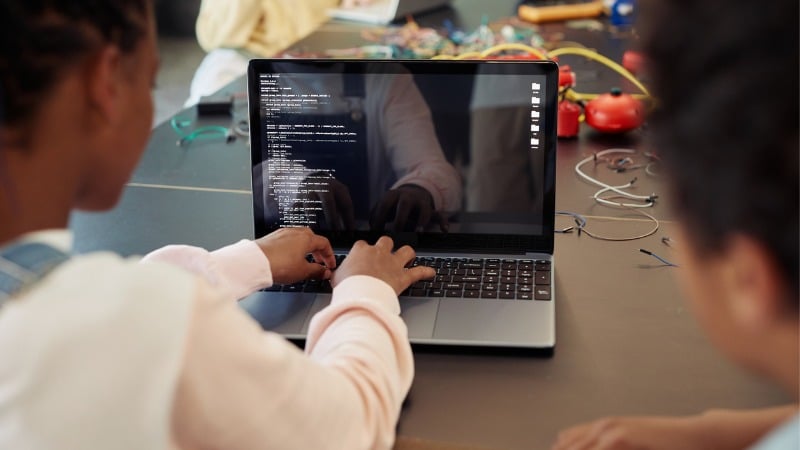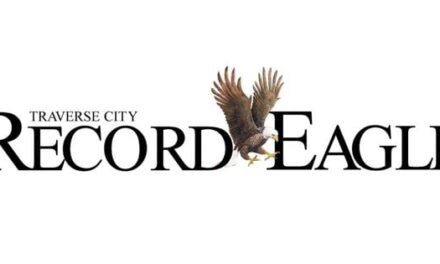
In more than two decades of working in the tech industry, Tammy Buckner rarely saw co-workers who look like her.
“I didn’t see women represented in technology and specifically Black women represented in technology,” said Buckner, who has held jobs such as software developer, project manager and business analyst.
In 2018, she asked a friend who was a leader in coding programs in another state for help getting something similar started in Kansas City. A year later, Buckner launched a nonprofit, WeCode KC, to teach technology concepts and leadership skills to children in lower-income neighborhoods who might not have easy entry to the industry.
Although Black people represent 14% of both the U.S. population and the private industry workforce, their representation in the tech sector is only 7.4%, according to the U.S. Equal Employment Opportunity Commission. Black women make up just 3% of the tech workforce, according to a 2021 study by the National Center for Women & Information Technology.
“The main purpose is to serve the urban core and to encourage brown and Black kids, specifically Black kids, to get into technology because it is a lucrative career path, but most importantly because they need to see people that look like them,” Buckner said. “Because we are very underrepresented.”
WeCode KC
WeCode’s headquarters is at 5008 Prospect Ave. Students from ages 7 to 17 sign up for online and in-person sessions where they learn programming languages such as Scratch, Python, JavaScript, HTML and CSS.
They also have opportunities to build robots, work on virtual reality and cybersecurity projects and use a Raspberry Pi — a credit card-sized computer that plugs into computer monitors to build laptops and video games.
WeCode KC also assists students in securing internships and mentorships, and in learning soft skills necessary to operate in a business setting.
“We know that a lot of the time our kids don’t get the opportunity to see people who are in this tech space,” Buckner said. “Lots of times it presents an imposter syndrome, that they don’t think that they can do it, they don’t see people or they don’t see mentors who can encourage and help them.”
Last year, WeCode’s staff and volunteers served more than 620 students.
For graduates older than 18, WeCode offers an alumni network where members can polish their skills or become mentors or volunteer instructors for younger students.
And for adults, WeCode offers a free certification program, in partnership with the state of Missouri, to help learners gain skills needed to enter the tech industry.
Along with providing a stepping stone into the tech workforce, WeCode is helping to keep bright minds in Kansas City. Cities such as San Francisco; Austin, Texas; Washington, D.C., and New York continue to draw the larger numbers of tech talent.
“We have various companies that are coming into Kansas City — Panasonic, Meta and some others,” Buckner said. “So we do want to encourage people to come back because there have been a lot of people that get into not only the tech space but other industries and they leave.”
She added, “It is so important that we stay where we are in the urban core, so that families will come back, so that we can continue to build that tech hub that Kansas City truly wants to be.”
Diversity in tech
Tech-sector employers, including Google, Apple and IBM, prioritize skills and experience over a formal education and often a college degree.
About 26% of the IT workforce in the U.S. does not have a college degree, according to the U.S. Bureau of Labor Statistics. That includes about 18% of computer and information systems managers.
But many Black and brown students from the country’s poorest regions struggle to gain access to the industry.
Even Kansas City confronts a digital divide. About 7% of households do not have a computer, while 14% of households do not have broadband internet access, according to the U.S. Census Bureau.
This lack of access is skewed along race and location. A 2020 KC Connectivity report by mySidewalk, a data collection organization, found that the areas ranked the highest in its digital divide index were east of Troost Avenue and in the historic northeast and were predominantly Black and underfunded.
“You also see situations of no internet access or no high-speed internet access at home. This is why we ask students to come to our location because we have that available,” Buckner said.
Students from lower-income backgrounds may also not have had a chance to acquire the unspoken professional skills needed to succeed in a work environment.
“Even when you get into technology there are still barriers like a culture fit,” Buckner said. “You may work at a tech company, but you don’t really feel like you belong. So these are areas we’re working on with tech companies. How can we assist with retaining incentives when you start hiring more minorities into your company?”
Kyaira Boughton, who studies computation and design at a university in China, joined WeCode KC in 2021. During a Zoom call with The Beacon, she described her struggle to feel valued as a young Black woman studying technology.
“I think the biggest difficulty is probably being taken seriously,” she said.
“Even if you do know what you’re talking about, it takes a while for people to be like, ‘Oh, yeah, actually, you’re right.’ And even then, that doesn’t mean you’ll get the credit for it.”
Boughton says the mentorship she received from Buckner at WeCode, and from groups such as the National Center for Women in Technology, has helped her to navigate these experiences.
“I can reach out to her with questions, more specifically on the business side …. you know, reaching out for contacts, getting connections, learning how to network and all that stuff,” she said.
When she finishes college, Boughton hopes to return to Kansas City.
“I want to make KC one of those tech hubs, but I also feel like I need to get a little bit more experience outside of KC,” she said.
WeCode focuses on mentorships and internships for older students. It helped Boughton receive a website development internship in Kansas City.
“There’s a lot of hand-holding as we don’t want them to just get these certifications and then just throw them to the wolves,” Buckner said. “It’s great to have that hand-holding and pairing them up with various tech companies and doing a soft handover.”
What’s next?
WeCode KC recently brought on Kimberly Bryant, the founder of the nationally recognized Silicon Valley-based nonprofit Black Girls CODE, as the organization’s interim board chair.
In its fourth year, the nonprofit is focused on expansion, including starting an after-school program.
“A lot of times our schools don’t get the opportunity to offer market value assets and be able to offer technology skills, so that is our goal,” Buckner said.
WeCode is looking to work with other groups to help students with transportation to its classes and programs. Buckner also hopes to move into a larger building in the next three to five years.
More immediately, the staff is always looking for more innovative and engaging technology for students, such as drones, music and sound engineering.
A big dream is to create a makerspace, or a collaborative workspace, in one of the Kansas City neighborhoods where WeCode students live.
“We want to open our doors up as much as we possibly can to expose our kids who normally don’t get this exposure,” said Buckner. “They don’t get this exposure in schools, likely will not get it at home, but we want to make sure that’s provided here at WeCode.”
—
This story was originally published by The Kansas City Beacon, an online news outlet focused on local, in-depth journalism in the public interest.
***
You may also like these posts on The Good Men Project:
Join The Good Men Project as a Premium Member today.
All Premium Members get to view The Good Men Project with NO ADS.
A $50 annual membership gives you an all access pass. You can be a part of every call, group, class and community.
A $25 annual membership gives you access to one class, one Social Interest group and our online communities.
A $12 annual membership gives you access to our Friday calls with the publisher, our online community.
Register New Account
Need more info? A complete list of benefits is here.
—
Photo credit: iStock.com




